329 start with N start with N
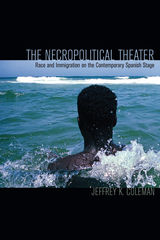
Coleman identifies an inherent racial hierarchy informed by the legacies of colonization and religious intolerance.
Drawing on theatrical texts, performances, legal documents, interviews, and critical reviews, this book challenges Spanish theater to develop a new theatrical space. Jeffrey K. Coleman proposes a “convivial theater” that portrays immigrants as contributors to the Spanish state and better represents the multicultural reality of the nation today.
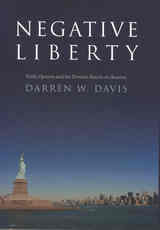
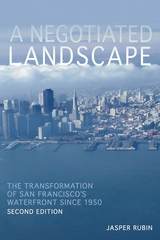
To understand this landscape Jasper Rubin not only explores the built environment but also the major forces that have been at work in its redevelopment. While factors such as new transportation technology and economic restructuring have been essential to the process and character of the waterfront’s transformation, the impact of local, grassroots efforts by planners, activists, and boosters have been equally critical.
The first edition of A Negotiated Landscape won the 2012 prize for best book in planning history from the International Planning History Society. Much has changed in the five years since that edition was published. For this second edition, Rubin provides a new concluding chapter that updates the progress of planning on San Francisco’s waterfront and examines debates over the newest visions for its development.

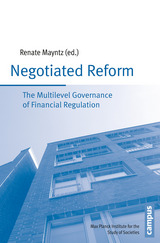
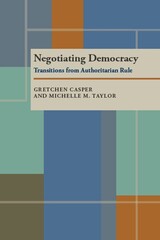
This book explains why some countries succeed in installing democracy after authoritarian rule, and why some of these new democracies make progress toward consolidation. Casper and Taylor show that a democratic government can be installed when elite bargaining during the transition process is relatively smooth. They view elite bargaining in twenty-four transitions cases, some where continued authoritarianism was the result, others where a democratic government was the result, and a third outcome where progress towards consolidation was the end product.

Rather than seeing U.S. empire in Puerto Rico during this period as a contest between two sharply polarized groups, del Moral views their interaction as a process of negotiation. Although educators and families rejected some tenets of Americanization, such as English-language instruction, they also redefined and appropriated others to their benefit to increase literacy and skills required for better occupations and social mobility. Pushing their citizenship-building vision through the schools, Puerto Ricans negotiated a different school project—one that was reformist yet radical, modern yet traditional, colonial yet nationalist.

When business leaders, government officials, and other stakeholders come to the table in an environmental, health, or safety dispute, acrimony often results, leading to expensive and time-consuming litigation. Not only does this waste precious resources, but rarely does the process produce the best outcome for any of the parties involved.
For the past five years, the authors of this volume have conducted semi-annual seminars at the Massachussetts Institute of Technology and at Harvard to provide business leaders and regulators with the knowledge and skills they need to more effectively handle environmental, health, and safety negotiations. Their strategy, known as the "mutual gains approach," is a proven method of producing fairer, more efficient, more stable, and wiser results. Negotiating Environmental Agreements provides the first comprehensive introduction to this widely practiced and highly effective approach to environmental regulation.
The book begins with an overview of the mutual gains approach, introducing important concepts and ideas from negotiation theory as well as the theory and practice of mediation. The authors then offer five model negotiations from their MIT-Harvard Public Disputes seminar, followed by a series of real-world negotiated environmental agreements that illustrate the kinds of outcomes possible when the mutual gains approach is employed. A collection of writings by leading experts provide valuable insights into the process, and appendixes offer both instructions for conducting model negotiation sessions and analysis of actual game results from earlier seminars.
This is the only prescriptive text available for the many regulatees and regulators involved in environmental regulatory negotiations each year. Anyone involved with environmental negotiation -- including corporate and public sector managers, students of environmental policy, environmental management, and business management -- will find the book an essential resource.
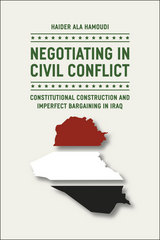

Much has been written about Indian water rights; for the many tribal and non-Indian stakeholders who rely upon western water, this book now offers practical guidance on how to negotiate them. By providing a comprehensive synthesis of western water issues, tribal water disputes, and alternative approaches to dispute resolution, it offers a valuable sourcebook for all—tribal councils, legislators, water professionals, attorneys—who need a basic understanding of the complexities of the situation.
The book reviews the history, current status, and case law related to western water while revealing strategies for addressing water conflicts among tribes, cities, farms, environmentalists, and public agencies. Drawing insights from the process, structure, and implementation of water rights settlements currently under negotiation or already agreed to, it presents a detailed analysis of how these cases evolve over time. It also provides a wide range of contextual materials, from the nuts and bolts of a Freedom of Information Act request to the hydrology of irrigation. It also includes contributed essays by expert authors on special topics, as well as interviews with key individuals active in water management and tribal water cases.
As stakeholders continue to battle over rights to water, this book clearly addresses the place of Native rights in the conflict. Negotiating Tribal Water Rights offers an unsurpassed introduction to the ongoing challenges these claims present to western water management while demonstrating the innovative approaches that states, tribes, and the federal government have taken to fulfill them while mitigating harm to both non-Indians and the environment.
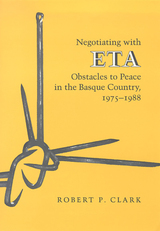
Since the late 1960s, the Basque insurgent organization ETA (Euzkadi ta Askatasuna, or Basque Homeland and Freedom) has been engaged in a violent struggle against the Spanish state in an effort to gain the independence of the Basque Country. ETA violence has led to the death of hundreds of people, making the organization the most violent insurgent group in Europe. Between 1975 and 1988, nearly thirty attempts to negotiate an end to violence, with a few limited exceptions, all ended in failure. This important book examines why the efforts to negotiate have failed and makes suggestions on how to improve the chances for successful discussion in the future. Although Clark does not disprove the conventional wisdom that negotiation with terrorists is a bad idea, he does begin from the opposing point of view that there may be some positive values to be realized from such negotiation.Negotiating with ETA describes the various factions that are interested in the outcome of such negotiations and the Spanish antiterrorist policy throughout the period under examination. The book also recounts the early attempts to negotiate, the first attempt at "social reintegration," various attempts by the Basque Government to get negotiations started, negotiation efforts under the Spanish socialist government of Felipe González, and the lengthy negotiations that took place in Algeria. A wide range of scholars and specialists will find this book valuable, including those interested in contemporary Spanish politics, ethnic nationalism, Basque affairs, the problem of terrorism, and conflict resolution.
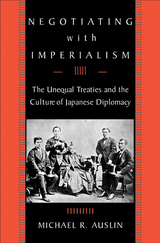
Japan's modern international history began in 1858 with the signing of the "unequal" commercial treaty with the United States. Over the next fifteen years, Japanese diplomacy was reshaped to respond to the Western imperialist challenge. Negotiating with Imperialism is the first book to explain the emergence of modern Japan through this early period of treaty relations.
Michael Auslin dispels the myth that the Tokugawa bakufu was diplomatically incompetent. Refusing to surrender to the West's power, bakufu diplomats employed negotiation as a weapon to defend Japan's interests. Tracing various visions of Japan's international identity, Auslin examines the evolution of the culture of Japanese diplomacy. Further, he demonstrates the limits of nineteenth-century imperialist power by examining the responses of British, French, and American diplomats. After replacing the Tokugawa in 1868, Meiji leaders initially utilized bakufu tactics. However, their 1872 failure to revise the treaties led them to focus on domestic reform as a way of maintaining independence and gaining equality with the West.
In a compelling analysis of the interplay among assassinations, Western bombardment of Japanese cities, fertile cultural exchange, and intellectual discovery, Auslin offers a persuasive reading of the birth of modern Japan and its struggle to determine its future relations with the world.

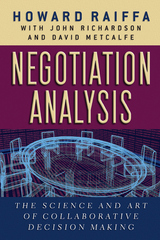
This masterly book substantially extends Howard Raiffa's earlier classic, The Art and Science of Negotiation. It does so by incorporating three additional supporting strands of inquiry: individual decision analysis, judgmental decision making, and game theory. Each strand is introduced and used in analyzing negotiations.
The book starts by considering how analytically minded parties can generate joint gains and distribute them equitably by negotiating with full, open, truthful exchanges. The book then examines models that disengage step by step from that ideal. It also shows how a neutral outsider (intervenor) can help all negotiators by providing joint, neutral analysis of their problem.
Although analytical in its approach--building from simple hypothetical examples--the book can be understood by those with only a high school background in mathematics. It therefore will have a broad relevance for both the theory and practice of negotiation analysis as it is applied to disputes that range from those between family members, business partners, and business competitors to those involving labor and management, environmentalists and developers, and nations.
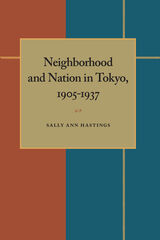

What makes an urban neighborhood tick? Why do some of a city’s poorest neighborhoods have cleaner streets and less vandalism than many of its more affluent areas? The public services that make certain neighborhoods stand out are often provided by the local residents themselves—but what makes them take action?
The setting for Matthew Crenson’s book is Baltimore. In this surprising, powerful work, he finds that such neighborhood action does not arise from a strong sense of neighborliness or community feeling. Instead, it is precisely when neighbors dislike one another that some features of informal self-organization emerge. Residents’ efforts to maintain public order, health, and safety frequently spring from social chaos and discord rather than from homogeneity. In fact, Crenson discovers that in many cases community polities arise not from the cohesiveness of close-knit “urban villages” but from the social diversity, inequality, and conflict that are associated with urbanism itself.
In an era when the inability of government institutions to solve the difficulties of city living is starkly apparent, understanding unofficial neighborhood government is critically important, and it can also clarify the foundations of political order itself. Crenson’s achievement is to redefine neighborhood problem-solving as the true “grass roots” urban politics, and in doing so he reveals why Baltimore is one of the few big cities that really work in America today.
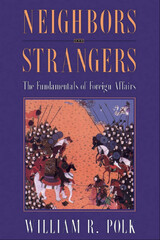
Indeed, going deeper into the human experience, Polk documents "fear of the foreigner" as a visceral response so deep-seated and so pervasive that it transcends human memory, individual experience and even logical analysis. More generally, he shows that the tension created by having to live as neighbors with those who, in the definition of contemporaries, were irredeemably alien has been one of the major causes of the rise of civilizations.
Accessible and engaging, Neighbors and Strangers is a revelatory look at how foreign affairs are a profound reflection of human nature.
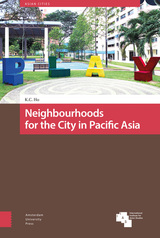
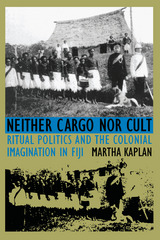
Engaging Fijian oral history and texts as well as colonial records, Kaplan resituates Tuka in the flow of indigenous Fijian history-making and rereads the archives for an ethnography of British colonizing power. Proposing neither unchanging indigenous culture nor the inevitable hegemony of colonial power, she describes the dialogic relationship between plural, contesting, and changing articulations of both Fijian and colonial culture.
A remarkable enthnographic account of power and meaning, Neither Cargo nor Cult addresses compelling questions within anthropological theory. It will attract a wide audience among those interested in colonial and postcolonial societies, ritual and religious movements, hegemony and resistance, and the Pacific Islands.
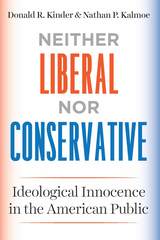
Well, American elites disagree fiercely. But average Americans do not. This, at least, was the position staked out by Philip Converse in his famous essay on belief systems, which drew on surveys carried out during the Eisenhower Era to conclude that most Americans were innocent of ideology. In Neither Liberal nor Conservative, Donald Kinder and
Nathan Kalmoe argue that ideological innocence applies nearly as well to the current state of American public opinion. Real liberals and real conservatives are found in impressive numbers only among those who are deeply engaged in political life. The ideological battles between American political elites show up as scattered skirmishes in the general public, if they show up at all.
If ideology is out of reach for all but a few who are deeply and seriously engaged in political life, how do Americans decide whom to elect president; whether affirmative action is good or bad? Kinder and Kalmoe offer a persuasive group-centered answer. Political preferences arise less from ideological differences than from the attachments and antagonisms of group life.
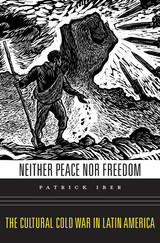
During the Cold War, left-wing Latin American artists, writers, and scholars worked as diplomats, advised rulers, opposed dictators, and even led nations. Their competing visions of social democracy and their pursuit of justice, peace, and freedom led them to organizations sponsored by the governments of the Cold War powers: the Soviet-backed World Peace Council, the U.S.-supported Congress for Cultural Freedom, and, after the 1959 Cuban Revolution, the homegrown Casa de las Américas.
Neither Peace nor Freedom delves into the entwined histories of these organizations and the aspirations and dilemmas of intellectuals who participated in them, from Diego Rivera and Pablo Neruda to Gabriel García Márquez and Jorge Luis Borges. Patrick Iber corrects the view that such individuals were merely pawns of the competing superpowers. Movements for democracy and social justice sprung up among pro-Communist and anti-Communist factions, and Casa de las Américas promoted a brand of revolutionary nationalism that was beholden to neither the Soviet Union nor the United States.
But ultimately, intellectuals from Latin America could not break free from the Cold War’s rigid binaries. With the Soviet Union demanding fealty from Latin American communists, the United States zealously supporting their repression, and Fidel Castro pushing for regional armed revolution, advocates of social democracy found little room to promote their ideals without compromising them. Cold War politics had offered utopian dreams, but intellectuals could get neither the peace nor the freedom they sought.

Scholars today take for granted the existence of a “wall of separation” dividing the three branches of the federal government. Neither Separate nor Equal: Congress in the 1790s demonstrates that such lines of separation among the legislative, executive, and judicial branches, however, were neither so clearly delineated nor observed in the first decade of the federal government's history.
The first two essays describe the social and cultural milieu attending the movement of the republican court from New York to Philadelphia and the physical and social environment of Philadelphia in the 1790s. The following section examines the congressional career of New York's Egbert Benson, the senatorial career of Robert Morris as an expression of his economic interests, the vigorous opposition of Rep. William Branch Giles to the Federalist policies of the Washington administration, and finally the underappreciated role of congressional spouses.
The last five essays concentrate on areas of interbranch cooperation and conflict. In particular, they discuss the meaning of separation of powers in the 1790s, Washington as an active president with Congress, the contrast between Hamilton's and Jefferson's exercise of political influence with Congress, and John Adams's relationship with Congress during the Quasi-War crisis.
The essays in this collection, the second volume of the series Perspectives on the History of Congress, 1789-1801, originated in two conferences held in 1995 and 1996 by the United States Capitol Historical Society.
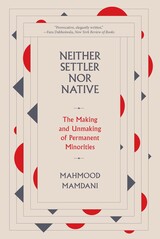
Prospect Top 50 Thinker of 2021
British Academy Book Prize Finalist
PROSE Award Finalist
“Provocative, elegantly written.”
—Fara Dabhoiwala, New York Review of Books
“Demonstrates how a broad rethinking of political issues becomes possible when Western ideals and practices are examined from the vantage point of Asia and Africa.”
—Pankaj Mishra, New York Review of Books
In case after case around the globe—from Israel to Sudan—the colonial state and the nation-state have been constructed through the politicization of a religious or ethnic majority at the expense of an equally manufactured minority. The model emerged in America, where genocide and internment on reservations created a permanent native minority. In Europe, this template would be used both by the Nazis and the Allies.
Neither Settler nor Native offers a vision for arresting this process. Mahmood Mamdani points to inherent limitations in the legal solution attempted at Nuremberg. Political violence demands political solutions: not criminal justice but a rethinking of the political community to include victims and perpetrators, bystanders and beneficiaries. Making the radical argument that the nation-state was born of colonialism, he calls on us to delink the nation from the state so as to ensure equal political rights for all who live within its boundaries.
“A deeply learned account of the origins of our modern world…Mamdani rejects the current focus on human rights as the means to bring justice to the victims of this colonial and postcolonial bloodshed. Instead, he calls for a new kind of political imagination…Joining the ranks of Hannah Arendt’s Imperialism, Frantz Fanon’s The Wretched of the Earth, and Edward Said’s Orientalism, this book is destined to become a classic text of postcolonial studies and political theory.”
—Moustafa Bayoumi, author of How Does It Feel to Be a Problem?
“A masterwork of historical comparison and razor-sharp political analysis, with grave lessons about the pitfalls of forgetting, moralizing, or criminalizing this violence. Mamdani also offers a hopeful rejoinder in a revived politics of decolonization.”
—Karuna Mantena, Columbia University
“A powerfully original argument, one that supplements political analysis with a map for our political future.”
—Faisal Devji, University of Oxford

Uncovering a vast maze of realities in the media theories of Marshall McLuhan
The term “global village”—coined in the 1960s by Marshall McLuhan—has persisted into the twenty-first century as a key trope of techno-humanitarian discourse, casting economic and technical transformations in a utopian light. Against that tendency, this book excavates the violent history, originating with techniques of colonial rule in Africa, that gave rise to the concept of the global village. To some extent, we are all global villagers, but given the imbalances of semiotic power, some belong more thoroughly than others. Reassessing McLuhan’s media theories in light of their entanglement with colonial and neocolonial techniques, Nolan implicates various arch-paradigms of power (including “terra-power”) in the larger prerogative of managing human populations.
Forerunners: Ideas First is a thought-in-process series of breakthrough digital publications. Written between fresh ideas and finished books, Forerunners draws on scholarly work initiated in notable blogs, social media, conference plenaries, journal articles, and the synergy of academic exchange. This is gray literature publishing: where intense thinking, change, and speculation take place in scholarship.
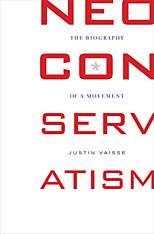
Neoconservatism has undergone a transformation that has made a clear identity almost impossible to capture. The Republican foreign policy operatives of the George W. Bush era seem far removed from the early liberal intellectuals who focused on domestic issues. Justin Vaïsse offers the first comprehensive history of neoconservatism, exploring the connections between a changing and multifaceted school of thought, a loose network of thinkers and activists, and American political life in turbulent times.
In an insightful portrait of the neoconservatives and their impact on public life, Vaïsse frames the movement in three distinct ages: the New York intellectuals who reacted against the 1960s leftists; the “Scoop Jackson Democrats,” who tried to preserve a mix of hawkish anticommunism abroad and social progress at home but failed to recapture the soul of the Democratic Party; and the “Neocons” of the 1990s and 2000s, who are no longer either liberals or Democrats. He covers neglected figures of this history such as Pat Moynihan, Eugene Rostow, Lane Kirkland, and Bayard Rustin, and offers new historical insight into two largely overlooked organizations, the Coalition for a Democratic Majority and the Committee on the Present Danger. He illuminates core developments, including the split of liberalism in the 1960s, and the shifting relationship between partisan affiliation and foreign policy positions.
Vaïsse gives neoconservatism its due as a complex movement and predicts it will remain an influential force in the American political landscape.

The rise of British neoliberalism—a renewed emphasis on privatization and market-oriented economics—over the last fifty years is often characterized as the product of right-wing political economists, think tanks, and politicians. The Neoliberal Age? argues that this pat narrative ignores broader forces in British left-wing culture that collaborated to transform twentieth-century social life. Through a variety of case studies, the authors demonstrate that our austere, individualistic age emerged from more complex sociopolitical negotiations than typically described.
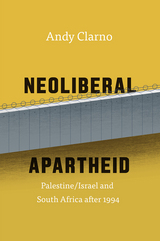
After a decade of research in the Johannesburg and Jerusalem regions, Andy Clarno presents here a detailed ethnographic study of the precariousness of the poor in Alexandra township, the dynamics of colonization and enclosure in Bethlehem, the growth of fortress suburbs and private security in Johannesburg, and the regime of security coordination between the Israeli military and the Palestinian Authority in the West Bank. The first comparative study of the changes in these two areas since the early 1990s, the book addresses the limitations of liberation in South Africa, highlights the impact of neoliberal restructuring in Palestine, and argues that a new form of neoliberal apartheid has emerged in both contexts.
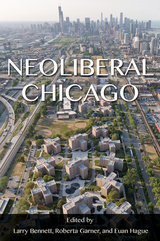

Katrina was not just a hurricane. The death, destruction, and misery wreaked on New Orleans cannot be blamed on nature’s fury alone. This volume of essays locates the root causes of the 2005 disaster squarely in neoliberal restructuring and examines how pro-market reforms are reshaping life, politics, economy, and the built environment in New Orleans.
The authors—a diverse group writing from the disciplines of sociology, political science, education, public policy, and media theory—argue that human agency and public policy choices were more at fault for the devastation and mass suffering experienced along the Gulf Coast than were sheer forces of nature. The harrowing images of flattened homes, citizens stranded on rooftops, patients dying in makeshift hospitals, and dead bodies floating in floodwaters exposed the moral and political contradictions of neoliberalism—the ideological rejection of the planner state and the active promotion of a new order of market rule.
Many of these essays offer critical insights on the saga of postdisaster reconstruction. Challenging triumphal narratives of civic resiliency and universal recovery, the authors bring to the fore pitched battles over labor rights, gender and racial justice, gentrification, the development of city master plans, the demolition of public housing, policing, the privatization of public schools, and roiling tensions between tourism-based economic growth and neighborhood interests. The contributors also expand and deepen more conventional critiques of “disaster capitalism” to consider how the corporate mobilization of philanthropy and public good will are remaking New Orleans in profound and pernicious ways.
Contributors: Barbara L. Allen, Virginia Polytechnic U; John Arena, CUNY College of Staten Island; Adrienne Dixson, Ohio State U; Eric Ishiwata, Colorado State U; Avis Jones-Deweever, National Council of Negro Women; Chad Lavin, Virginia Polytechnic U; Paul Passavant, Hobart and William Smith Colleges; Linda Robertson, Hobart and William Smith Colleges; Chris Russill, Carleton U; Kanchana Ruwanpura, U of Southampton; Nicole Trujillo-Pagán, Wayne State U; Geoffrey Whitehall, Acadia U.

Why are people getting fatter in the United States and beyond? Mainstream explanations argue that people simply eat too much “energy-dense” food while exercising too little. By swapping the chips and sodas for fruits and vegetables and exercising more, the problem would be solved. By contrast, The Neoliberal Diet argues that increased obesity does not result merely from individual food and lifestyle choices. Since the 1980s, the neoliberal turn in policy and practice has promoted trade liberalization and retrenchment of the welfare regime, along with continued agricultural subsidies in rich countries. Neoliberal regulation has enabled agribusiness multinationals to thrive by selling highly processed foods loaded with refined flour and sugars—a diet that originated in the United States—as well as meat. Drawing on extensive empirical data, Gerardo Otero identifies the socioeconomic and political forces that created this diet, which has been exported around the globe, often at the expense of people’s health.
Otero shows how state-level actions, particularly subsidies for big farms and agribusiness, have ensured the dominance of processed foods and made healthful fresh foods inaccessible to many. Comparing agrifood performance across several nations, including the NAFTA region, and correlating food access to class inequality, he convincingly demonstrates the structural character of food production and the effect of inequality on individual food choices. Resolving the global obesity crisis, Otero concludes, lies not in blaming individuals but in creating state-level programs to reduce inequality and make healthier food accessible to all.
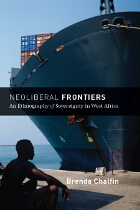
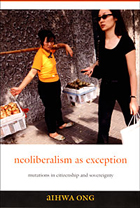
Ong traces how these and other neoliberal exceptions to business as usual are reconfiguring relationships between governing and the governed, power and knowledge, and sovereignty and territoriality. She argues that an interactive mode of citizenship is emerging, one that organizes people—and distributes rights and benefits to them—according to their marketable skills rather than according to their membership within nation-states. Those whose knowledge and skills are not assigned significant market value—such as migrant women working as domestic maids in many Asian cities—are denied citizenship. Nevertheless, Ong suggests that as the seam between sovereignty and citizenship is pried apart, a new space is emerging for NGOs to advocate for the human rights of those excluded by neoliberal measures of human worthiness.
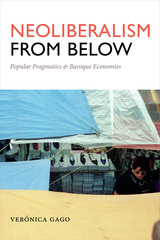

Contributors draw their conclusions from ethnographic fieldwork in contemporary urban spaces. They link neoliberalism in Vietnam to a set of globally diverse technical practices, institutions, modes of power, and governing strategies; for example, in its shifting currency regimes and its anticorruption campaigns. Contributors also explore the growing emphasis on self-improvement and modernization through studies of architecture, changing beauty standards, and the impact of in vitro fertilization. Biopolitical logics and the self-regulation of moral personhood are also addressed in essays on HIV/AIDS and transnational adoption. The issue highlights the ways in which the socialist past is integral to the present in Vietnam, even as it is remade and newly configured.
Contributors: Erik Harms, Nina Hien, Ann Marie Leshkowich, Li Zhang, Ken MacLean, Alfred John Montoya, Melissa J. Pashigian, Christina Schwenkel, Allison Truitt
Guest editors: Christina Schwenkel (Associate Professor, Department of Anthropology, University of California at Riverside) and Ann Marie Leshkowich (Associate Professor and Chair, Department of Sociology and Anthropology, College of the Holy Cross).
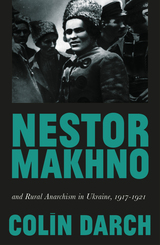
Between 1917 and 1921, the Makhnovists fought German and Austrian invaders, reactionary monarchist forces, Ukrainian nationalists and sometimes the Bolsheviks themselves. Drawing upon anarchist ideology, the Makhnovists gathered widespread support amongst the Ukrainian peasantry, taking up arms when under attack and playing a significant role - in temporary alliance with the Red Army - in the defeats of the White Generals Denikin and Wrangel. Often dismissed as a kulak revolt, or a manifestation of Ukrainian nationalism, Colin Darch analyses the successes and failures of the Makhnovist movement, emphasising its revolutionary character.
Over 100 years after the revolutions, this book reveals a lesser known side of 1917, contributing both to histories of the period and broadening the narrative of 1917, whilst enriching the lineage of anarchist history.
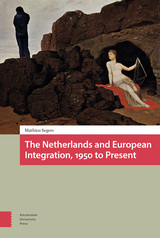
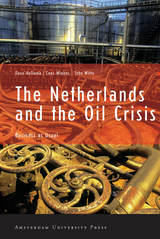

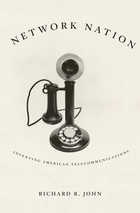
The telegraph and the telephone were the first electrical communications networks to become hallmarks of modernity. Yet they were not initially expected to achieve universal accessibility. In this pioneering history of their evolution, Richard R. John demonstrates how access to these networks was determined not only by technological imperatives and economic incentives but also by political decision making at the federal, state, and municipal levels.
In the decades between the Civil War and the First World War, Western Union and the Bell System emerged as the dominant providers for the telegraph and telephone. Both operated networks that were products not only of technology and economics but also of a distinctive political economy. Western Union arose in an antimonopolistic political economy that glorified equal rights and vilified special privilege. The Bell System flourished in a progressive political economy that idealized public utility and disparaged unnecessary waste.
The popularization of the telegraph and the telephone was opposed by business lobbies that were intent on perpetuating specialty services. In fact, it wasn’t until 1900 that the civic ideal of mass access trumped the elitist ideal of exclusivity in shaping the commercialization of the telephone. The telegraph did not become widely accessible until 1910, sixty-five years after the first fee-for-service telegraph line opened in 1845.
Network Nation places the history of telecommunications within the broader context of American politics, business, and discourse. This engrossing and provocative book persuades us of the critical role of political economy in the development of new technologies and their implementation.
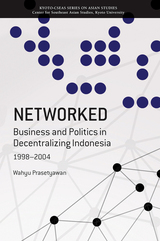
Networked Business and Politics in Decentralizing Indonesia evaluates three cases of deep-seated political conflict and intrigue including central government, local governments, and multinational companies. It looks at how the structure of the national political economy has changed as the result of local politicians becoming involved in disputes with the national government over control of natural resources. It also analyzes how these changes will affect the distribution of wealth in the country as well as Indonesia’s evolving democratic politics and modes of governance.
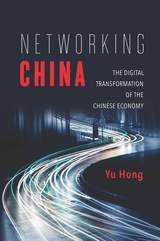
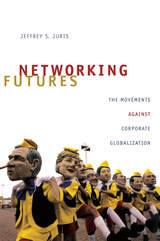
In an account full of activist voices and on-the-ground detail, Juris provides a history of anti–corporate globalization movements, an examination of their connections to local dynamics in Barcelona, and an analysis of movement-related politics, organizational forms, and decision-making. Depicting spectacular direct action protests in Barcelona and other cities, he describes how far-flung activist networks are embodied and how networking politics are performed. He further explores how activists have used e-mail lists, Web pages, and free software to organize actions, share information, coordinate at a distance, and stage “electronic civil disobedience.” Based on a powerful cultural logic, anti–corporate globalization networks have become models of and for emerging forms of radical, directly democratic politics. Activists are not only responding to growing poverty, inequality, and environmental devastation; they are also building social laboratories for the production of alternative values, discourses, and practices.

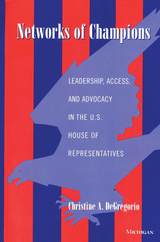
In Networks of Champions Christine A. DeGregorio identifies who in the U.S. House of Representatives took the lead in shepherding six major bills, dealing with welfare reform, drug control, international trade, farm policy, nuclear weapons testing, and assistance to the Contras, through Congress and how these champions of legislation worked with outside advocacy groups. DeGregorio finds that the champions of this legislation were drawn from a diverse group that included individuals both within and outside the formal hierarchy of leadership. The champions, who were not necessarily the prominent holders of important positions, are characterized by having knowledge of the subject matter, experience in the House, a facility for bargaining and compromise, the right committee assignments, and a commitment to hard work.
DeGregorio traces how these groups become influential and how the groups affect the policy-making process. She finds a reciprocal process in which advocacy groups use champions to express their views while champions use the resources of advocacy groups to gain influence in the House.
Based on extensive interviews with key congressional staff members and the leaders of advocacy groups, DeGregorio provides critical new insights into the legislative process. This book will be of interest to those who study the legislative process and the role of interest groups in making American policy.
". . . a substantial contribution to our understanding of advocacy in Congress." --Barbara Sinclair, University of California, Los Angeles
Christine A. DeGregorio is Associate Professor, Department of Government, School of Public Affairs, American University.

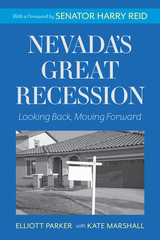
This is a different kind of economics book. Parker uses his expertise from doing research on the East Asian fiscal crisis to give profound insights into what happened and how to avoid future catastrophes. Marshall personalizes it by providing vignettes of what it was actually like to be in the trenches and fighting the inevitable political battles that came up, and counteracting some of the falsehoods that certain politicians were spreading about the recession.
Parker and Marshall’s book should be required reading for not only every single elected official in Nevada, but for any private citizen who cares about the public good.

Histories of women in Hollywood usually recount the contributions of female directors, screenwriters, designers, actresses, and other creative personnel whose names loom large in the credits. Yet, from its inception, the American film industry relied on the labor of thousands more women, workers whose vital contributions often went unrecognized.
For more information: http://erinhill.squarespace.com
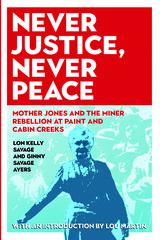
In 1986 Lon Savage published Thunder in the Mountains: The West Virginia Mine War, 1920–21, a popular history now considered a classic. Among those the book influenced are Denise Giardina, author of Storming Heaven, and John Sayles, writer and director of Matewan. When Savage passed away, he left behind an incomplete book manuscript about a lesser-known Mother Jones crusade in Kanawha County, West Virginia. His daughter Ginny Savage Ayers drew on his notes and files, as well as her own original research, to complete Never Justice, Never Peace—the first book-length account of the Paint Creek–Cabin Creek Strike of 1912–13.
Savage and Ayers offer a narrative history of the strike that weaves together threads about organizer Mother Jones, the United Mine Workers union, politicians, coal companies, and Baldwin-Felts Detective Agency guards with the experiences of everyday men and women. The result is a compelling and in-depth treatment that brings to light an unjustly neglected—and notably violent—chapter of labor history. Introduced by historian Lou Martin, Never Justice, Never Peace provides an accessible glimpse into the lives and personalities of many participants in this critical struggle.
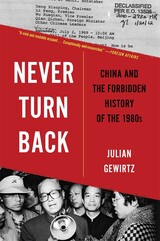
A Foreign Affairs Best Book of the Year
A BBC History Magazine Best Book of the Year
“Excellent…A fascinating, authoritative account of the paths for China’s future explored during a decade long buried by official, state-sponsored history.”—Julia Lovell, Foreign Policy
“A vivid and readable account…Exceptionally well-researched.” —Andrew Nathan, Foreign Affairs
"The definitive book on China in the 1980s in terms of the depth of research and originality of the argument." ―Minxin Pei, author of The Sentinel State
"A gift to our understanding of today’s China."―Evan Osnos, author of Age of Ambition
On a hike in Guangdong Province in January 1984, Deng Xiaoping was warned that his path was a steep and treacherous one. “Never turn back,” the Chinese leader replied. That became a mantra as the government forged ahead with reforms in the face of heated contestation over the nation’s future.
Recovering the debates of China in the 1980s, Julian Gewirtz traces the Communist Party’s diverse attitudes toward markets, state control, and sweeping technological change, as well as freewheeling public argument over political liberalization. Deng Xiaoping’s administration considered bold proposals from within the party and without, but after Tiananmen, Beijing systematically erased these discussions of alternative directions. Using newly available Chinese sources, Gewirtz details how the leadership purged the key reformist politician Zhao Ziyang, quashed the student movement, recast the transformations of the 1980s as the inevitable products of consensus, and indoctrinated China and the international community in the new official narrative.
Never Turn Back offers a revelatory look at how different China’s rise might have been and at the foundations of strongman rule under Xi Jinping, who has intensified the policing of history to bolster his own authority.
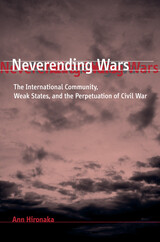
Since 1945, the average length of civil wars has increased three-fold. What can explain this startling fact? It can't be ethnic hatreds and injustices—these have been around for centuries. In Neverending Wars, Ann Hironaka points to the crucial role of the international community in propping up many new and weak states that resulted from the decolonization movement after World War II. These impoverished states are prone to conflicts and lack the necessary resources to resolve them decisively. International aid and external military intervention from the international community often perpetuate such conflicts. And the Cold War further exacerbated the problem by providing large amounts of military aid. The continual infusion of weapons and resources can prolong such wars indefinitely.
This timely book will provide an entirely new way to look at recent, vicious civil wars, failed states, and the terrorist movements that emerge in their wake.
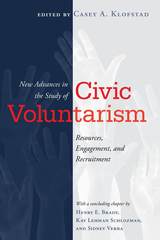
Individuals who are civically active have three things in common: they have the capacity to do so, they want to, and they have been asked to participate. New Advances in the Study of Civic Voluntarism is dedicated to examining the continued influence of these factors—resources, engagement, and recruitment—on civic participation in the twenty-first century.
The contributors to this volume examine recent social, political, technological, and intellectual changes to provide the newest research in the field. Topics range from race and religion to youth in the digital age, to illustrate the continued importance of understanding the role of the everyday citizen in a democratic society.
Contributors include:Molly Andolina, Allison P. Anoll, Leticia Bode, Henry E. Brady, Traci Burch, Barry C. Burden, Andrea Louise Campbell, David E. Campbell, Sara Chatfield, Stephanie Edgerly, Zoltán Fazekas, Lisa García Bedoll, Peter K. Hatemi, John Henderson, Krista Jenkins, Yanna Krupnikov, Adam Seth Levine, Melissa R. Michelson, S. Karthick Ramakrishnan, Dinorah Sánchez Loza, Kay Lehman Schlozman, Dhavan Shah, Sono Shah, Kjerstin Thorson, Sidney Verba, Logan Vidal, Emily Vraga, Chris Wells, JungHwan Yang, and the editor.

The fate of Cleveland, Ohio, rides on a web of interdependencies on a regional scale. People and communities throughout that area of Ohio are being forced to adjust to new civic roles. The city of Cleveland must understand how it fits into Greater Cleveland. And suburbs must understand their dependence on the historic central city and be drawn into the Cleveland community.
In this sweeping study by local and national experts, these and more specific issues are raised and examined in depth. The New American City Faces Its Regional Future captures the dynamic thinking concerned with Cleveland and its surrounding region. The authors address questions of importance not only to Cleveland and its region but also to communities across the country that are facing similar issues. How does the city want to grow in the future? How can it become a more livable community? As the population of the region moves farther and farther out from the established urban areas, consuming more and more land, and as it enters its third century, these questions will need to be addressed. This book takes some first, important steps toward providing the answers.

In this definitive study, Warren E. Miller and J. Merrill Shanks present a comprehensive, authoritative analysis of American voting patterns from 1952 through the early 1990s, with special emphasis on the 1992 election, based on data collected by the National Election Studies. For example, Miller and Shanks reveal that:
The loudly trumpeted "dealignment" of the 1970s and 1980s, along with the decline in voter turnout, was in fact an acute "nonalignment" and noninvolvement of new cohorts entering the electorate.
The social correlates of the Republican/Democratic divisions on party identification among Southern voters have changed dramatically over a forty-year period.
Enduring cultural and ideological predispositions play a major role in shaping voters' reactions to election campaigns and their choice for President.
Personalities of presidential candidates and their positions on campaign issues tend to matter far less than is often claimed.
Perot's appeal in 1992 can be attributed to the same factors that distinguished between supporters of Clinton and Bush.
In an unprecedented analysis of individual elections and long-term trends, and of changes within regions, ethnic groups, and gender and age categories, The New American Voter presents a unique social and economic picture of partisanship and participation in the American electoral process. This work is likely to become an instant classic.

Negotiating a peaceful end to civil wars, which often includes an attempt to bring together former rival military or insurgent factions into a new national army, has been a frequent goal of conflict resolution practitioners since the Cold War. In practice, however, very little is known about what works, and what doesn’t work, in bringing together former opponents to build a lasting peace.
Contributors to this volume assess why some civil wars result in successful military integration while others dissolve into further strife, factionalism, and even renewed civil war. Eleven cases are studied in detail—Sudan, Zimbabwe, Lebanon, Rwanda, the Philippines, South Africa, Mozambique, Bosnia-Herzegovina, Sierra Leone, Democratic Republic of the Congo, and Burundi—while other chapters compare military integration with corporate mergers and discuss some of the hidden costs and risks of merging military forces. New Armies from Old fills a serious gap in our understanding of civil wars, their possible resolution, and how to promote lasting peace, and will be of interest to scholars and students of conflict resolution, international affairs, and peace and security studies.

While some of these essays take up key thinkers in Marxist history or draw attention to outstanding problematics, others focus on national literature and discourse in North and South Korea, the "Mao Zedong Fever" of the 1990s, the implications of Li Dazhao's poetry, and the Indian Naxalite movement. Illustrating the importance of central analytical categories like exploitation, alienation, and violence to studies on the politics of knowledge, contributors confront prevailing global consumerist fantasies
with accounts of political struggle, cultural displacement, and theoretical strategies.
Contributors. Tani E. Barlow, Dai Jinhua, Michael Dutton, D. R. Howland, Marshall Johnson, Liu Kang, You-me Park, William Pietz, Claudia Pozzana, Alessandro Russo, Sanjay Seth, Gi-Wook Shin, Sugiyama Mitsunobu, Jing Wang

The New Babel: Toward a Poetics of the Mid-East Crises evokes and investigates—from a Jewish American perspective and in the forms of poetry, essays, and interviews—the Israeli-Palestinian conflict, America’s involvement as both perpetrator and victim of events in the Middle East and Afghanistan, and the multiple ways that poetics can respond to political imperatives.
The poems range from the immediately lyrical to the experimental forms of the “Apple Anyone Sonnets” series, which relies heavily on the Arabic but has Shakespeare as its scaffolding.
In the essays, Schwartz calls on the power of poetry—and of some of the great poets in the Arabic, Jewish, and American traditions—to help rethink the battle lines of the contemporary Mid-East, with the Jewish philosopher Martin Buber looming large.
The interviews provide Schwartz’s discussions with Israeli poet and activist Aharon Shabtai, political philosopher Michael Hardt, and the late, great American poet Amiri Baraka.
In these creative, analytical, and conversational moments, Leonard Schwartz rethinks the battle lines of the contemporary Middle East and calls on the power of language as the essence of our humanity, endlessly fluid, but also the source of an intentional confusion there is a necessity to counter.

“At the turn of the present century, when the idea of a transition from an age of scarcity to an era of abundance was first explored by a few American social scientists, the overwhelming weight of professional and lay opinion in Europe and the United States defended the assumption of scarcity. When Simon Patten articulated his belief that enough goods and services would be produced in the foreseeable future to provide every human being with the requisites for survival, he was a lonely forerunner of the present tenuous consensus… For a generation, the concept of abundance was synonymous with Simon Patten. He raised issues which still disturb those who speculate about ways to improve the quality of American life.”—from the Introduction
Simon Patten was professor of economics at the Wharton School of the University of Pennsylvania from 1887 until his death in 1917. Throughout his working life he sought to justify his conviction that men could create and sustain an age of abundance by developing appropriate restraints. He was an early believer in the enforcement of contract laws that were pro-labor, in the limitation of consumer credit, and in restraints on speculation. He insisted that progress was hindered mainly by ignorance and prejudice, which could be overcome by a higher standard of living, by education, and by increased opportunity for everyone. Patten’s activities coincided with the growth of philanthropy in America, and he was one of the earliest promoters of professional social work.
In The New Basis of Civilization, originally published in 1907, Patten tried to modify traditional assumptions about the permanence of poverty, the effects of a more equitable distribution of wealth, and the possibility of substantial improvements in the standard of living. The new basis of an abundant civilization required, in his view, new strategies and tactics for planning and implementing social change.
In his Introduction, Daniel M. Fox examines the reasons Patten accepted the idea of abundance half a century before it achieved popularity, and shows how the concept of abundance became part of the way a significant number of Americans look at the world.
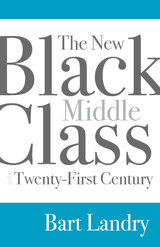
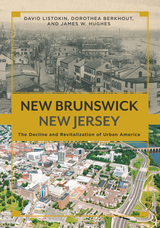
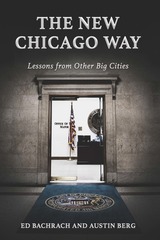
Rather than simply lament the situation, criticize specific leaders, or justify an ideology, Bachrach and Berg compare the decisions about Chicago’s governance and finances with choices made in fourteen other large U.S. cities. The problems that seem unique to Chicago have been encountered elsewhere, and Chicagoans, the authors posit, can learn from the successful solutions other cities have embraced.
Chicago government and its citizens must let go of the past to prepare for the future, argue Bachrach and Berg. A future filled with demographic, technological, and economic change requires a government capable of responding and adapting. Reforms can transform the city. The prescriptions for change provided in this book point toward a hopeful future: the New Chicago Way.
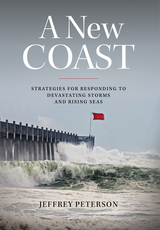
More severe storms and rising seas will inexorably push the American coastline inland with profound impact on communities, infrastructure, and natural systems. In A New Coast, Jeffrey Peterson draws a comprehensive picture of how storms and rising seas will change the coast. Peterson offers a clear-eyed assessment of how governments can work with the private sector and citizens to be better prepared for the coming coastal inundation.
Drawing on four decades of experience at the Environmental Protection Agency and the United States Senate, Peterson presents the science behind predictions for coastal impacts. He explains how current policies fall short of what is needed to effectively prepare for these changes and how the Trump Administration has significantly weakened these efforts. While describing how and why the current policies exist, he builds a strong case for a bold, new approach, tackling difficult topics including: how to revise flood insurance and disaster assistance programs; when to step back from the coast rather than build protection structures; how to steer new development away from at-risk areas; and how to finance the transition to a new coast. Key challenges, including how to protect critical infrastructure, ecosystems, and disadvantaged populations, are examined. Ultimately, Peterson offers hope in the form of a framework of new national policies and programs to support local and state governments. He calls for engagement from the private sector and local and national leaders in a “campaign for a new coast.”
A New Coast is a compelling assessment of the dramatic changes that are coming to America’s coast. Peterson offers insights and strategies for policymakers, planners, and business leaders preparing for the intensifying impacts of climate change along the coast.
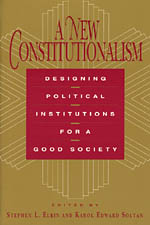
Believing that constitutionalism needs to go beyond the classical goal of limiting the arbitrary exercise of political power, the contributors argue that it should—and can—be designed to achieve economic efficiency, informed democratic control, and other valued political ends. More broadly, they believe that political and social theory needs to turn away from the negativism of critical theory to consider how a good society should be "constituted" and to direct the work of designing institutions that can constitute a "good polity," in both the economic and civic senses.
Stephen L. Elkin and Karol Edward Soltan begin with an overview of constitutionalist theory and a discussion of the new constitutionalism within the broader intellectual and historical context of political and social thought. Charles Anderson, James Ceaser, and the editors then offer different interpretations of the central issues regarding institutional design in a constitutionalist social science, consider various ways of performing the task, and discuss the inadequacy of recent political science to the job it ought to be doing. The book concludes with essays by Ted Lowi, Cass Sunstein and Edwin Haefele which apply these themes to the American regime.

Confronting insurgent violence in Iraq and Afghanistan, the U.S. military has recognized the need to “re-learn” counterinsurgency. But how has the Department of Defense with its mixed efforts responded to this new strategic environment? Has it learned anything from past failures?
In The New Counterinsurgency Era, David Ucko examines DoD’s institutional obstacles and initially slow response to a changing strategic reality. Ucko also suggests how the military can better prepare for the unique challenges of modern warfare, where it is charged with everything from providing security to supporting reconstruction to establishing basic governance—all while stabilizing conquered territory and engaging with local populations. After briefly surveying the history of American counterinsurgency operations, Ucko focuses on measures the military has taken since 2001 to relearn old lessons about counterinsurgency, to improve its ability to conduct stability operations, to change the institutional bias against counterinsurgency, and to account for successes gained from the learning process.
Given the effectiveness of insurgent tactics, the frequency of operations aimed at building local capacity, and the danger of ungoverned spaces acting as havens for hostile groups, the military must acquire new skills to confront irregular threats in future wars. Ucko clearly shows that the opportunity to come to grips with counterinsurgency is matched in magnitude only by the cost of failing to do so.
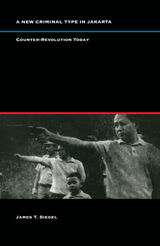
Examining the links between the concept of criminality and scandal, rumor, fear, and the state, Siegel analyzes daily life in Jakarta through the seemingly disparate but strongly connected elements of family life, gossip, and sensationalist journalism. He offers close analysis of the preoccupation with crime in Pos Kota (a newspaper directed toward the lower classes) and the middle-class magazine Tempo. Because criminal activity has been a sensationalized preoccupation in Jakarta’s news venues and among its people, criminality, according to Siegel, has pervaded the identities of its ordinary citizens. Siegel examines how and why the government, fearing revolution and in an attempt to assert power, has made criminality itself a disturbing rationalization for the spectacular massacre of the people it calls criminals—many of whom were never accused of particular crimes. A New Criminal Type in Jakarta reveals that Indonesians—once united by Sukarno’s revolutionary proclamations in the name of “the people”—are now, lacking any other unifying element, united through their identification with the criminal and through a “nationalization of death” that has emerged with Suharto’s strong counter-revolutionary measures.
A provocative introduction to contemporary Indonesia, this book will engage those interested in Southeast Asian studies, anthropology, history, political science, postcolonial studies, public culture, and cultural studies generally.

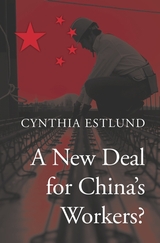
China’s labor landscape is changing, and it is transforming the global economy in ways that we cannot afford to ignore. Once-silent workers have found their voice, organizing momentous protests, such as the 2010 Honda strikes, and demanding a better deal. China’s leaders have responded not only with repression but with reforms. Are China’s workers on the verge of a breakthrough in industrial relations and labor law reminiscent of the American New Deal?
In A New Deal for China’s Workers? Cynthia Estlund views this changing landscape through the comparative lens of America’s twentieth-century experience with industrial unrest. China’s leaders hope to replicate the widely shared prosperity, political legitimacy, and stability that flowed from America’s New Deal, but they are irrevocably opposed to the independent trade unions and mass mobilization that were central to bringing it about. Estlund argues that the specter of an independent labor movement, seen as an existential threat to China’s one-party regime, is both driving and constraining every facet of its response to restless workers.
China’s leaders draw on an increasingly sophisticated toolkit in their effort to contain worker activism. The result is a surprising mix of repression and concession, confrontation and cooptation, flaws and functionality, rigidity and pragmatism. If China’s laborers achieve a New Deal, it will be a New Deal with Chinese characteristics, very unlike what workers in the West achieved in the last century. Estlund’s sharp observations and crisp comparative analysis make China’s labor unrest and reform legible to Western readers.

As America’s haves and have-nots drift further apart, rising inequality has undermined one of the nation’s proudest social achievements: the Social Security retirement system. Unprecedented changes in longevity, marriage, and the workplace have made the experience of old age increasingly unequal. For educated Americans, the traditional retirement age of 65 now represents late middle age. These lucky ones typically do not face serious impediments to employment or health until their mid-70s or even later. By contrast, many poorly educated earners confront obstacles of early disability, limited job opportunities, and unemployment before they reach age 65.
America’s system for managing retirement is badly out of step with these realities. Enacted in the 1930s, Social Security reflects a time when most workers were men who held steady jobs until retirement at 65 and remained married for life. The program promised a dignified old age for rich and poor alike, but today that egalitarian promise is failing. Anne L. Alstott makes the case for a progressive program that would permit all Americans to retire between 62 and 76 but would provide more generous early retirement benefits for workers with low wages or physically demanding jobs. She also proposes a more equitable version of the outdated spousal benefit and a new phased retirement option to permit workers to transition out of the workforce gradually.
A New Deal for Old Age offers a pragmatic and principled agenda for renewing America’s most successful and popular social welfare program.
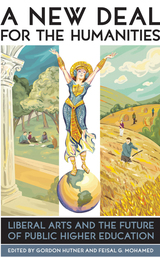
The contributors offer spirited and thought-provoking debates on a diverse range of topics. For instance, they deplore the push by administrations to narrow learning into quantifiable outcomes as well as the demands of state governments for more practical, usable training. Indeed, for those who suggest that a college education should be “practical”—that it should lean toward the sciences and engineering, where the high-paying jobs are—this book points out that while a few nations produce as many technicians as the United States does, America is still renowned worldwide for its innovation and creativity, skills taught most effectively in the humanities. Most importantly, the essays in this collection examine ways to make the humanities even more effective, such as offering a broader array of options than the traditional major/minor scheme, options that combine a student’s professional and intellectual interests, like the new medical humanities programs.
A democracy can only be as energetic as the minds of its citizens, and the questions fundamental to the humanities are also fundamental to a thoughtful life. A New Deal for the Humanities takes an intrepid step in making the humanities—and our citizens—even stronger in the future.
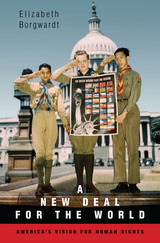
In a work of sweeping scope and luminous detail, Elizabeth Borgwardt describes how a cadre of World War II American planners inaugurated the ideas and institutions that underlie our modern international human rights regime.
Borgwardt finds the key in the 1941 Atlantic Charter and its Anglo-American vision of “war and peace aims.” In attempting to globalize what U.S. planners heralded as domestic New Deal ideas about security, the ideology of the Atlantic Charter—buttressed by FDR’s “Four Freedoms” and the legacies of World War I—redefined human rights and America’s vision for the world.
Three sets of international negotiations brought the Atlantic Charter blueprint to life—Bretton Woods, the United Nations, and the Nuremberg trials. These new institutions set up mechanisms to stabilize the international economy, promote collective security, and implement new thinking about international justice. The design of these institutions served as a concrete articulation of U.S. national interests, even as they emphasized the importance of working with allies to achieve common goals. The American architects of these charters were attempting to redefine the idea of security in the international sphere. To varying degrees, these institutions and the debates surrounding them set the foundations for the world we know today.
By analyzing the interaction of ideas, individuals, and institutions that transformed American foreign policy—and Americans’ view of themselves—Borgwardt illuminates the broader history of modern human rights, trade and the global economy, collective security, and international law. This book captures a lost vision of the American role in the world.

Contextualizing the different series aired by the Educational Radio Project as part of a unified project about radio and citizenship is crucial to understanding them. New Deal Radio argues that this distinctive government commercial partnership amounted to a critical intervention in US broadcasting and an important chapter in the evolution of public radio in America.
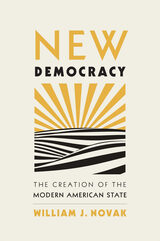
The activist state of the New Deal started forming decades before the FDR administration, demonstrating the deep roots of energetic government in America.
In the period between the Civil War and the New Deal, American governance was transformed, with momentous implications for social and economic life. A series of legal reforms gradually brought an end to nineteenth-century traditions of local self-government and associative citizenship, replacing them with positive statecraft: governmental activism intended to change how Americans lived and worked through legislation, regulation, and public administration. The last time American public life had been so thoroughly altered was in the late eighteenth century, at the founding and in the years immediately following.
William J. Novak shows how Americans translated new conceptions of citizenship, social welfare, and economic democracy into demands for law and policy that delivered public services and vindicated people’s rights. Over the course of decades, Americans progressively discarded earlier understandings of the reach and responsibilities of government and embraced the idea that legislators and administrators in Washington could tackle economic regulation and social-welfare problems. As citizens witnessed the successes of an energetic, interventionist state, they demanded more of the same, calling on politicians and civil servants to address unfair competition and labor exploitation, form public utilities, and reform police power.
Arguing against the myth that America was a weak state until the New Deal, New Democracy traces a steadily aggrandizing authority well before the Roosevelt years. The United States was flexing power domestically and intervening on behalf of redistributive goals for far longer than is commonly recognized, putting the lie to libertarian claims that the New Deal was an aberration in American history.
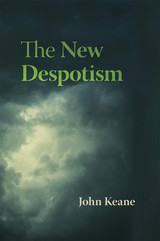
An Australian Book Review Best Book of the Year
A disturbing in-depth exposé of the antidemocratic practices of despotic governments now sweeping the world.
One day they’ll be like us. That was once the West’s complacent and self-regarding assumption about countries emerging from poverty, imperial rule, or communism. But many have hardened into something very different from liberal democracy: what the eminent political thinker John Keane describes as a new form of despotism. And one day, he warns, we may be more like them.
Drawing on extensive travels, interviews, and a lifetime of thinking about democracy and its enemies, Keane shows how governments from Russia and China through Central Asia to the Middle East and Europe have mastered a formidable combination of political tools that threaten the established ideals and practices of power-sharing democracy. They mobilize the rhetoric of democracy and win public support for workable forms of government based on patronage, dark money, steady economic growth, sophisticated media controls, strangled judiciaries, dragnet surveillance, and selective violence against their opponents.
Casting doubt on such fashionable terms as dictatorship, autocracy, fascism, and authoritarianism, Keane makes a case for retrieving and refurbishing the old term “despotism” to make sense of how these regimes function and endure. He shows how they cooperate regionally and globally and draw strength from each other’s resources while breeding global anxieties and threatening the values and institutions of democracy. Like Montesquieu in the eighteenth century, Keane stresses the willing complicity of comfortable citizens in all these trends. And, like Montesquieu, he worries that the practices of despotism are closer to home than we care to admit.

Walter W. Heller was Chairman of the Council of Economic Advisers throughout President Kennedy's Administration and during the first year of President Johnson's. Here, in a book of immediate importance and great vision, he examines the profound and rapid changes that are taking place during the 1960's in American economic policy. In this decade economics has come of age, and the Keynesian revolution has been completed.
The economic health and stability of the nation are now among the President's major concerns. The need to formulate policy in this area has thrust the political economist into a new and leading role as Presidential adviser, and Mr. Heller is in a unique position to offer an inside account of these developments.
In his first book since leaving Washington to return to the University of Minnesota, he describes the emergence of Presidents Kennedy and Johnson as practicing economists, evaluates their economic policies, and sketches the patterns that are being established for the future. He tells how the grip of economic myths and false fears has been loosened in the government, with the result that economic policy is focused on sustaining prosperity without inflation, on speeding economic growth, and on realizing the fruits of true fiscal abundance.
Finally, Mr. Heller for the first time discusses in detail his own plan for revenue sharing, a new method of enlarging the flow of Federal funds to the states. The plan offers the exciting promise of a stronger fiscal base for our federalism, not only by expanding the present system of Federal grants, but also--when the demands of Vietnam relent--by developing new forms of fiscal support for state and local government.
Parts of this book were delivered by Mr. Keller as the Godkin Lectures at Harvard University in March 1966.
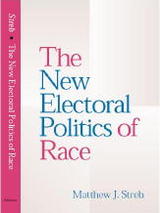
Historically, race has always been at the heart of American politics, and southern politics more specifically. Southern elections revolved almost entirely around racial issues during the 1950s and 1960s as debates raged over integration of schools, voting rights, and busing patterns. The election of George Wallace as governor of Alabama in 1962 underscored the electoral power of ruthless racial rhetoric, not only in Alabama, but throughout the South and the entire country. Almost 40 years later, segregation is no longer legal, tensions between blacks and whites have lessened, and the influx of large numbers of African Americans into the electorate has forced politicians to court black voters.
Matthew Streb finds, however, that although extreme racial rhetoric has disappeared from the modern campaign trail, voters are still polarized along racial lines. By comparing gubernatorial campaigns in four southern and three northern states-Alabama, Georgia, Arkansas, Virginia, Ohio, Iowa, and Massachusetts-the author examines how candidates use, or fail to use, race in their campaign strategies. He demonstrates that race indeed remains a significant factor in American elections, couched in alternative issues, such as affirmative action, profiling, and social welfare.
Streb's analysis of the appeal by politicians for the elite vote and the public vote reveals that class has replaced race as a definitive issue in American politics. This book will, therefore, be important not only to academic libraries and students and scholars of political science, southern history, and civil rights, but also to pollsters, campaign strategists, and state political party officials.
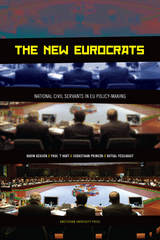
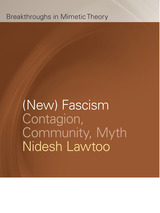
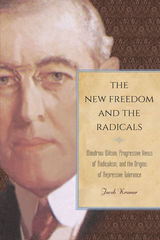
In The New Freedom and the Radicals, Jacob Kramer deftly examines how progressivism emerged at a time of critical transformation in American life. Using original archival sources, Kramer presents a study of Wilsonian-era politics to convey an understanding of the progressives’ views on radical America.
The New Freedom and the Radicals shows how the reactions of progressives to radicals accelerated the pace of reform in the United States, but how the movement was at times predisposed to repressing the radical elements to its left. In addition, Kramer asks to what extent progressives were responding to and influenced by those who opposed the state, capitalism, and the class structure altogether, as well as how progressives’ views of them changed in relation to events.
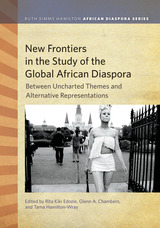
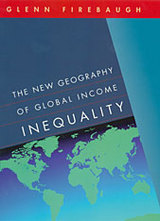
The surprising finding of this book is that, contrary to conventional wisdom, global income inequality is decreasing. Critics of globalization and others maintain that the spread of consumer capitalism is dramatically polarizing the worldwide distribution of income. But as the demographer Glenn Firebaugh carefully shows, income inequality for the world peaked in the late twentieth century and is now heading downward because of declining income inequality across nations. Furthermore, as income inequality declines across nations, it is rising within nations (though not as rapidly as it is declining across nations). Firebaugh claims that this historic transition represents a new geography of global income inequality in the twenty-first century.
This book documents the new geography, describes its causes, and explains why other analysts have missed one of the defining features of our era—a transition in inequality that is reducing the importance of where a person is born in determining his or her future well-being.

We are in the midst of an energy revolution, led by the United States. As the world’s greatest producer of natural gas moves aggressively to expand its exports of liquefied natural gas (LNG), America stands poised to become an energy superpower—an unanticipated development with far-reaching implications for the international order. Agnia Grigas drills deep into today’s gas markets to uncover the forces and trends transforming the geopolitics of gas.
The boom in shale gas production in the United States, the growth of global LNG trade, and the buildup of gas transport infrastructure worldwide have so transformed the traditional markets that natural gas appears to be on the verge of becoming a true global commodity. Traditional suppliers like Russia, whose energy-poor neighbors were dependent upon its gas exports and pipelines, are feeling the foundations of the old order shifting beneath their feet. Grigas examines how this new reality is rewriting the conventional rules of intercontinental gas trade and realigning strategic relations among the United States, the European Union, Russia, China, and beyond.
In the near term, Moscow’s political influence will erode as the Russian gas giant Gazprom loses share in its traditional markets while its efforts to pivot eastward to meet China’s voracious energy needs will largely depend on Beijing’s terms. In this new geopolitics of gas, the United States will enjoy opportunities but also face challenges in leveraging its newfound energy clout to reshape relations with both European states and rising Asian powers.
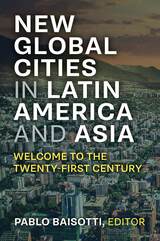
New Global Cities in Latin America and Asia: Welcome to the Twenty-First Century proposes new visions of global cities and regions historically considered “secondary” in the international context. The arguments are not only based on material progress made by these metropolises, but also on the growing social difficulties experienced (e.g., organized crime, drug trafficking, slums, economic inequalities). The book illustrates the growth of cities according to these problems arising from the modernity of the new century, comparing Latin American and Asian cities.
This book analyzes the complex relationships within cities through an interdisciplinary approach, complementing other research and challenging orthodox views on global cities. At the same time, the book provides new theoretical and methodological tools to understand the progress of “Third World” cities and the way of understanding “globality” in the 21st century by confronting the traditional views with which global cities were appreciated since the 1980s. Pablo Baisotti brings together researchers from various fields who provide new interpretative keys to certain cities in Latin America and Asia.


Contributors to this collection include major voices in the fields of philosophy, critical literature, sociology, anthropology, and communication studies. The articles consider how people conceive of and categorize themselves as part of a cohesive group under the multiple rubrics of the public and counterpublic, nation, ethnos, civilization, genealogy, democracy, and the market. Many of the essays are situated in specific national and cultural sites such as Africa, Australia, eighteenth-century England, the European Union, India, and Turkey. Others examine the intersections of global financial markets and democratic institutions.
As a whole, New Imaginaries suggests a new way of synthesizing economic, political, and cultural approaches to social life.
Contributors. Arjun Appadurai, Craig Calhoun, Dilip Parameshwar Gaonkar, Nilüfer Göle, Benjamin Lee, Edward LiPuma, Achille Mbembe, Mary Poovey, Elizabeth A. Povinelli, Charles Taylor, Michael Warner
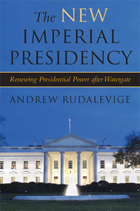
"Well written and, while indispensable for college courses, should appeal beyond academic audiences to anyone interested in how well we govern ourselves. . . . I cannot help regarding it as a grand sequel for my own The Imperial Presidency."
---Arthur Schlesinger, Jr.
Has the imperial presidency returned? This question has been on the minds of many contemporary political observers, as recent American administrations have aimed to consolidate power.
In The New Imperial Presidency, Andrew Rudalevige suggests that the congressional framework meant to advise and constrain presidential conduct since Watergate has slowly eroded. Rudalevige describes the evolution of executive power in our separated system of governance. He discusses the abuse of power that prompted what he calls the "resurgence regime" against the imperial presidency and inquires as to how and why---over the three decades that followed Watergate---presidents have regained their standing.
Chief executives have always sought to interpret constitutional powers broadly. The ambitious president can choose from an array of strategies for pushing against congressional authority; finding scant resistance, he will attempt to expand executive control. Rudalevige's important and timely work reminds us that the freedoms secured by our system of checks and balances do not proceed automatically but depend on the exertions of public servants and the citizens they serve. His story confirms the importance of the "living Constitution," a tradition of historical experiences overlaying the text of the Constitution itself.
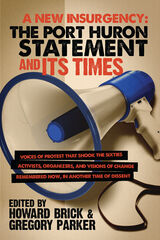
This volume features three never-before-published “manifesto drafts” written by Tom Hayden in early 1962 that generated the discussion leading to the Port Huron meeting. Other highlights include recollections from leading women in the Port Huron deliberations who, three years later, protested the subordination of women within the radical movements, thus setting the stage for the rise of women’s liberation. A New Insurgency is based on the University of Michigan’s conference commemorating the fiftieth anniversary of the Port Huron Statement in 2012.
“The fiftieth anniversary of the Port Huron Statement has drawn a great number of reflections and commemorations, but this carefully conceived volume offers an account of unrivaled ambition, exceptional breadth, and surprising insight. It both excavates the event itself—vividly, perceptively, exhaustively—and gives it the largest and most illuminating of contexts. A New Insurgency is as close to definitive as any volume of this kind can become.”
—Geoff Eley, Karl Pohrt Distinguished University Professor of Contemporary History, University of Michigan
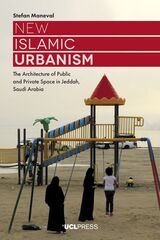
Combining Michael Warner’s concepts of publics and counterpublics with theories of space and sociological approaches to architecture, Stefan Maneval explores the concept of New Islamic Urbanism in Saudi Arabia, arguing that this architectural trend, which is characterized by an emphasis on privacy protection through high enclosures, gates, blinds, and tinted windows, constitutes for some an important element of piety. At the same time, it enables different conceptions of privacy, banned social practices, as well as the formation of publics and counterpublics.
Based on rich ethnographic data collected by the author, New Islamic Urbanism challenges normative assumptions on gender segregation in Muslim societies and provides a nuanced account of the meaning of publicness and privacy in Muslim contexts in general. It will be of particular interest to an academic readership in Middle East and Islamic studies, as well as in architecture, urban planning and anthropology.

Ortner tracked down nearly all 304 of her classmates. She interviewedabout 100 in person and spoke with most of the rest by phone, recording her classmates’ vivid memories of time, place, and identity. Ortner shows how social class affected people’s livesin many hidden and unexamined ways. She also demonstrates that the Class of ‘58’s extreme upward mobility must be understood in relation to the major identity movements of the twentieth century—the campaign against anti-Semitism, the Civil Rights movement, and feminism.
A multisited study combining field research with an interdisciplinary analytical framework, New Jersey Dreaming is a masterly integration of developments at the vanguard of contemporary anthropology. Engaging excerpts from Ortner's field notes are interspersed throughout the book. Whether recording the difficulties and pleasures of studying one's own peer group, the cultures of driving in different parts of the country, or the contrasting experiences of appointment-making in Los Angeles and New York, they provide a rare glimpse into the actual doing of ethnographic research.
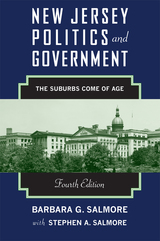
Offering a comprehensive overview of New Jersey politics and government, chapters cover the state’s political history; campaigns and elections; interest groups; the constitution; the development of government institutions; relationships with neighboring states, the federal government, and its own municipalities and counties; tax and spending policies; education; and quality of life issues.
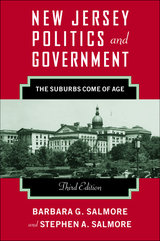
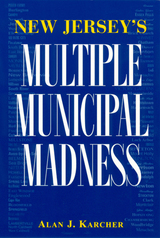
Alan Karcher looks at the history and high cost of New Jersey's multiple municipalities. He investigates the economic considerations, political pressures, and personal agendas that created the bizarre configurations dividing the Garden State, while analyzing the public policies that allowed and even encouraged the formation of new municipalities. Karcher also examines the political dynamics that thwarted every effort of New Jersey metropolises to join the front ranks of major American cities.
Karcher identifies the major motivations behind the unparalleled experience of New Jersey's municipal multiplication. He delves deeply into the primary causes of new lines being drawn, such as road appropriations, the location of a railroad station, control of a local school district, the regulation of alcohol sales, and the preservation of exclusivity prior to the acceptance of zoning. He also assesses the present situation and what has happened in the past 60 years since the municipal multiplication madness ceased, calling on elected officials to confront reality and correct yesterday's excesses.
The genesis of the present political map of the state is a story that while interesting is not always charming, while fascinating is far from edifying. Little in the history can be called quaint. Rather it is a story of separation and exclusion, of division and greed, of preservation of prerogatives and prejudices. It is a story that supports the conclusion that these lines are rarely the product of chance, rather they were drawn by politicians with very human foibles and frailties, and with very narrow agendas-agendas that have proven to be egregiously expensive for today's taxpayers.
Alan Karcher, the former Speaker of the New Jersey Assembly during the activist 1980s, currently practices municipal law in Middlesex County. He represents the third generation of his family to serve as a member of the New Jersey State Legislature.
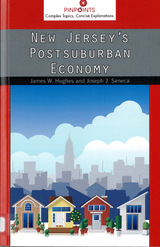
From the rural agricultural and natural resource based economy and lifestyle of the seventeenth century to today’s postindustrial, suburban-dominated, automobile-dependent economy, the economic drivers which were considered to be an asset are now viewed by many to be the state’s greatest disadvantage. On the brink of yet another transformation, this one driven by a new technology and an internet based global economy, New Jersey will have to adapt itself yet again—this time to a postsuburban digital economy.
Hughes and Seneca describe the forces that are now propelling the state into yet another economic era. They do this in the context of historical economic transformations of New Jersey, setting out the technological, demographic, and transportation shifts that defined and drove them.
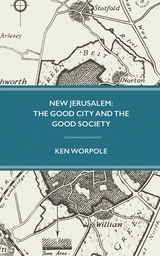
In 1902, Ebenezer Howard, renowned social reformer and founder of the garden movement, published Garden Cities of To-Morrow, a book originally to be called New Jerusalem and a work that became one of the most influential town planning documents of the twentieth century.
In New Jerusalem: The Good City and the Good Society, Ken Worpole reveals that utopian and visionary thinking, especially in relation to new forms of settlement and livelihood, has not gone away, even if it has gone underground.
With an unprecedented growth in the population of older people, along with increasing cultural and demographic change elsewhere in society, there is renewed interest in more convivial forms of urban design, as well as shared living. This interest draws on a long history of elective communities, including those influenced by the thought and works of Emanuel Swedenborg—a fascinating history with much to offer the architects and policymakers of today.

It is a powerful story: the relationship between the 1960s New Left and organized labor was summed up by hardhats confronting students and others over US involvement in Vietnam. But the real story goes beyond the "Love It or Leave It" signs and melees involving blue-collar types attacking protesters.
Peter B. Levy challenges these images by exploring the complex relationship between the two groups. Early in the 1960s, the New Left and labor had cooperated to fight for civil rights and anti-poverty programs. But diverging opinions on the Vietnam War created a schism that divided these one-time allies. Levy shows how the war, combined with the emergence of the black power movement and the blossoming of the counterculture, drove a permanent wedge between the two sides and produced the polarization that remains to this day.

New Lives for Ancient and Extinct Crops profiles nine plant species that were important contributors to human diets and had medicinal uses in antiquity: maygrass, chenopod, marshelder, agave, little barley, chia, arrowroot, little millet, and bitter vetch. Each chapter is written by a well-known scholar, who illustrates the global value of the ancient crop record to inform the present. From eastern and western North America, Mesoamerica, South America, western Asia, and south-central Asia, the contributors provide examples of the unexpected wealth of information available in the archaeological record about ancient and extinct crops.
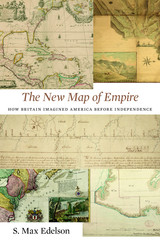
After the Treaty of Paris ended the Seven Years’ War in 1763, British America stretched from Hudson Bay to the Florida Keys, from the Atlantic coast to the Mississippi River, and across new islands in the West Indies. To better rule these vast dominions, Britain set out to map its new territories with unprecedented rigor and precision. Max Edelson’s The New Map of Empire pictures the contested geography of the British Atlantic world and offers new explanations of the causes and consequences of Britain’s imperial ambitions in the generation before the American Revolution.
Under orders from King George III to reform the colonies, the Board of Trade dispatched surveyors to map far-flung frontiers, chart coastlines in the Gulf of St. Lawrence, sound Florida’s rivers, parcel tropical islands into plantation tracts, and mark boundaries with indigenous nations across the continental interior. Scaled to military standards of resolution, the maps they produced sought to capture the essential attributes of colonial spaces—their natural capacities for agriculture, navigation, and commerce—and give British officials the knowledge they needed to take command over colonization from across the Atlantic.
Britain’s vision of imperial control threatened to displace colonists as meaningful agents of empire and diminished what they viewed as their greatest historical accomplishment: settling the New World. As London’s mapmakers published these images of order in breathtaking American atlases, Continental and British forces were already engaged in a violent contest over who would control the real spaces they represented.
Accompanying Edelson’s innovative spatial history of British America are online visualizations of more than 250 original maps, plans, and charts.
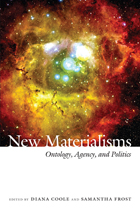
Coole and Frost argue that contemporary economic, environmental, geopolitical, and technological developments demand new accounts of nature, agency, and social and political relationships; modes of inquiry that privilege consciousness and subjectivity are not adequate to the task. New materialist philosophies are needed to do justice to the complexities of twenty-first-century biopolitics and political economy, because they raise fundamental questions about the place of embodied humans in a material world and the ways that we produce, reproduce, and consume our material environment.
Contributors
Sara Ahmed
Jane Bennett
Rosi Braidotti
Pheng Cheah
Rey Chow
William E. Connolly
Diana Coole
Jason Edwards
Samantha Frost
Elizabeth Grosz
Sonia Kruks
Melissa A. Orlie

In our globalizing world, the movement of people and resources has accelerated, giving rise to transnational connections and interdependencies. New Patterns for Mexico examines novel and emerging patterns of United States giving to Mexico and its impact on equitable development. Last year alone, Mexican migrants living in the United States sent billions of dollars back to families and relatives living in Mexico. Most of these funds were for private consumption, but more and more diaspora resources support social and philanthropic endeavors in their country of origin. This bilingual volume asks: What are these new patterns of diaspora giving and how do they affect equitable development in Mexico?
Through its Global Philanthropy Program, the Global Equity Initiative of Harvard University aims to advance knowledge about global philanthropy and the role of private philanthropic investments in furthering global equity. This volume, one in a series on diaspora giving, builds upon the earlier work of Diaspora Philanthropy: Perspectives on India and China and continues the Program's research series on the relationship between diaspora engagement and equitable development.

This volume brings together essays on the nature of political organization of the Moche, a complex pre-Inca society that existed on the north coast of Peru from c. 100 to 800 CE. Since the discovery of the royal tombs of Sipán in 1987, the Moche have become one of the best-known pre-Hispanic cultures of the Americas and the focus of a number of archaeological projects. But the nature of Moche political organization is still debated. Some scholars view the Moche as a monolithic state, others see a clear distinction between a northern and southern Moche polity, and yet others argue that the most accurate model is one in which each valley contained an independent polity. In a presentation of new data and new perspectives, the authors debate these competing theories.
Based on a set of papers presented by sixteen international scholars at the Dumbarton Oaks Pre-Columbian Studies symposium held in Lima, Peru, in 2004, this volume marks an important point in the development of Moche archaeology and will be a landmark work in Pre-Columbian studies.
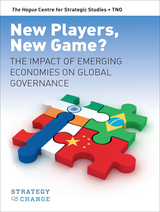

The New Politics of Beijing–Hong Kong Relations particularly examines the paternalistic authoritarianism that can be seen in Beijing's policy toward Hong Kong since the promulgation of the national security law in late June 2020. Lo analyzes the ideological shift from liberal nationalism to conservative nationalism on the mainland Chinese side since late 2012. The increasingly radical localism on the Hong Kong side after 2014 altered Beijing-Hong Kong relations and introduced factional struggles. While the imposition of the national security law into Hong Kong in late June 2020 has stabilized the city politically, Beijing's policy toward Hong Kong is now guided by the principles of protecting its national security and maintaining economic pragmatism, with implications for Beijing's relations with Taipei in the coming years.
READERS
Browse our collection.
PUBLISHERS
See BiblioVault's publisher services.
STUDENT SERVICES
Files for college accessibility offices.
UChicago Accessibility Resources
home | accessibility | search | about | contact us
BiblioVault ® 2001 - 2024
The University of Chicago Press









